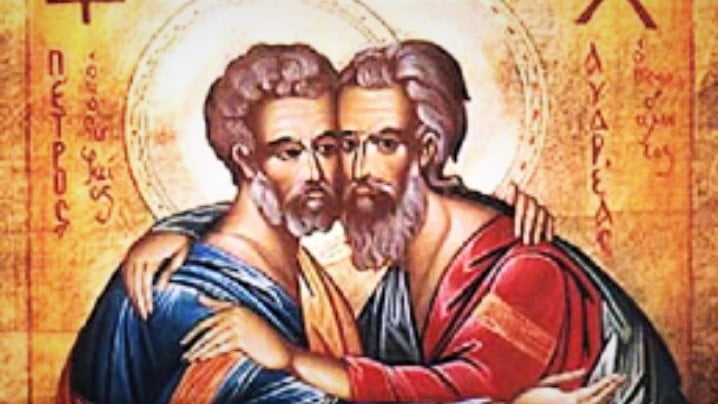DAILY GOSPEL COMMENTARY:
“GO FIRST AND BE RECONCILED WITH YOUR BROTHER (Mt 5:20-26).”

Thursday, 10th week in Ordinary Time
GOSPEL
Mt 5:20–26
“You have heard that it was said to your ancestors: You shall not kill; and whoever kills will be liable to judgment. But I say to you, whoever is angry with his brother will be liable to judgment, and whoever says to his brother, Raqa, will be answerable to the Sanhedrin, and whoever says, ‘You fool,’ will be liable to fiery Gehenna. Therefore, if you bring your gift to the altar, and there recall that your brother has anything against you, leave your gift there at the altar, go first and be reconciled with your brother, and then come and offer your gift. Settle with your opponent quickly while on the way to court. Otherwise your opponent will hand you over to the judge, and the judge will hand you over to the guard, and you will be thrown into prison. Amen, I say to you, you will not be released until you have paid the last penny.”
- As Our Lord has just said, it is not possible to hate the brother and participate in the Eucharist, the sacrament of Love.
- We could ask ourselves right now if we still bear hatred and grudges against a person and ask Our Lord for the grace to put the means so that forgiveness, reconciliation, and peace would be possible.
- We must also learn to expel pride from ourselves for it is the source of all enmity and disharmony in our environment, and above the first obstacle to receive God’s mercy.
- We must exert effort as well to say ‘sorry’ when we have offended someone, exercise patience, and forgive promptly and generously. In this respect St Leo the Great says:
- Although we should endeavour to sanctify our bodies at all times, now especially, during the Lenten fasts, you should perfect yourselves through the practice of a more active piety. Give alms; this is very effective in helping us correct ourselves of our faults; but also forgive offences — and stop complaining about those who have done you some harm (St Leo the Great, Sermon 45 on Lent).
- Whenever we attend Holy Mass and approach the divine altar, let us make sure that our heart is free from resentment and enmity. Only then could we fulfill our Lord’s words: go first and be reconciled with your brother, and then come and offer your gift.
A great day ahead!
Fr. Rolly Arjonillo
FROM THE NAVARRE BIBLE, COMMENTARY TO THE GOSPEL OF ST. MATTHEW (With permission)
- vv. 21-26 give us a concrete example of the way that Jesus Christ brought the Law of Moses to its fulfilment, by explaining the deeper meaning of the commandments of that law.
- V. 22 By speaking in the first person (“but I say to you”) Jesus shows that his authority is above that of Moses and the prophets; that is to say, he has divine authority. No mere man could claim such authority.
- “Insults”: practically all translations of this passage transcribe the original Aramaic word, Raca (cf. RSV note below). It is not an easy word to translate. It means “foolish, stupid, crazy”. The Jews used it to indicate utter contempt; often, instead of verbal abuse they would show their feelings by spitting on the ground.
- “Fool” translates an even stronger term of abuse than raca — implying that a person has lost all moral and religious sense, to the point of apostasy.
- In this passage our Lord points to three faults which we commit against charity, moving from internal irritation to showing total contempt.
- St Augustine comments that three degrees of faults and punishments are to be noted. The first is the fault of feeling angry; to this corresponds the punishment of “judgment”. The second is that of passing an insulting remark, which merits the punishment of “the council”. The third arises when anger quite blinds us: this is punished by “the hell of fire” (cf. De Serm. Dom. in monte, II, 9).
- “The hell of fire”: literally, “Gehenna of fire”, meaning, in the Jewish language of the time, eternal punishment.
- This shows the gravity of external sins against charity — gossip, backbiting, calumny etc.
- However, we should remember that these sins stem from the heart; our Lord focusses our attention, first, on internal sins resentment, hatred etc. to make us realize that that is where the root lies and that it is important to nip anger in the bud.
- VV. 23-24 Here our Lord deals with certain Jewish practices of his time, and in doing so gives us perennial moral teaching of the highest order.
- Christians, of course, do not follow these Jewish ritual practices; to keep our Lord’s commandment we have ways and means given us by Christ himself.
- Specifically, in the New and definitive Covenant founded by Christ, being reconciled involves going to the sacrament of Penance. In this sacrament the faithful “obtain pardon from God’s mercy for the offence committed against him, and are, at the same time, reconciled with the Church which they have wounded by their sins” (Lumen gentium, 11).
- In the New Testament, the greatest of all offerings is the Eucharist. Although one has a duty to go to Holy Mass on Sundays and holy days of obligation, an essential condition before receiving Holy Communion is that one be in the state of grace.
- It is not our Lord’s intention here to give love of neighbour priority over love of God. There is an order in charity:“You shall love the Lord your God with all your heart, with all your soul and with all your strength. This is the great and first commandment” (Mt. 22:37-38).
- Love of one’s neighbour, which is the second commandment in order of importance (cf. Mt 22:39), derives its meaning from the first.
- Brotherhood without parenthood is inconceivable.
- An offence against charity is, above all, an offence against God.
VIDEO COMMENTARY:
TOPIC 1: DOES YOUR ANGER KEEP YOU AWAKE AT NIGHT?
In today’s gospel reading, Jesus tells us that our love for one another should go farther than that of the Pharisees and Scribes. The laws that they have handed down from Moses will not mean anything if the intent is bereft of love.
TOPIC 2: DO YOU HOLD GRUDGES AGAINST PEOPLE?
In today’s gospel reading, Jesus talks about righteousness that is not skin-deep. It is not merely following the laws of man but obeying the law of love, the law of God. Anger can derail our resolve, especially if we are onion-skinned and prone to holding grudges.Do we carry a list of wrongs done against us in our minds?
Stay updated: subscribe by email for free TO OUR NEW WEBSITE www.catholicsstrivingforholiness.org (PUT YOUR EMAIL IN THE SUBSCRIBE WIDGET).
We are also in www.fb.com/Catholicsstrivingforholiness. Kindly help more people in their Christian life by liking our page and inviting your family, friends and relatives to do so as well. Thanks in advance and God bless you and your loved ones! Fr. Rolly Arjonillo


